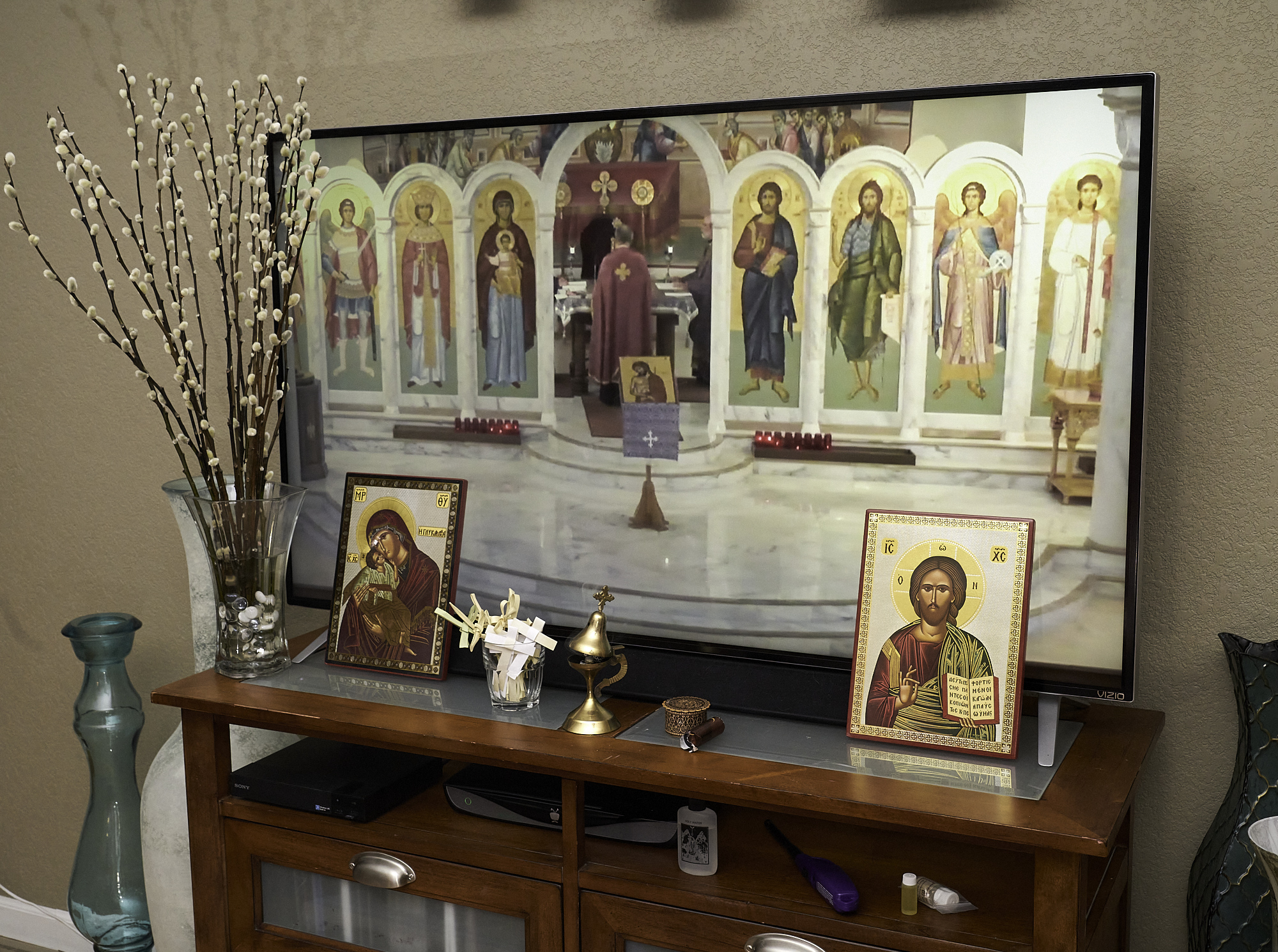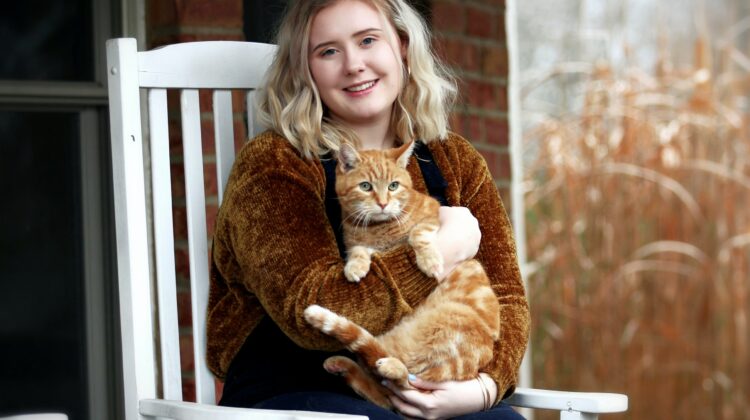On Holy Saturday Caitlin and I wore dresses and stood in front of our TV in the family room, ready for the Resurrectional Canon at 11:15 pm. Our coffee table featured candles, a censer with charcoal, incense pellets, and Bic lighter at the ready, and a jar of construction-paper crosses from Palm Sunday at our home church. Rob was at our parish church, monitoring the video livestream in the choir loft.

I had been wrestling with mixed feelings about a Pandemic Pascha. I steeled myself for tears, for sadness, for missing our beloved community in Christ. Away from the temple, I thought I would be distracted by dusty surfaces and a sink full of drying dishes that needed clearing. The grief of separation had hit hard on Holy Tuesday; surely a lonely Pascha would be worse.
Yet somehow, in a small but significant domestic miracle—the sort that doesn’t make it into inspirational books or magazines—I felt anticipation and even a quiet joy.

The joy lasted through the beautiful hymns and through the sleepy yawns. Around midnight, we turned off the lights in our home church to echo the darkened nave on our screen. We lit our baptismal candles along with our parish clergy and swooped the flames carefully, right–left, up–down, in the sign of the cross as we sang along,
Christ is risen from the dead,
Trampling down death by death,
And to those in the tombs
He has granted life.
No, the celebration was not ideal. Our community was scattered. Nonetheless, Christ was risen then. And today, Christ is risen. Truly He is risen! This ultimate reality does not change, whether believers participate in normal parish life, worship secretly in a prison camp, or worship freely during a pandemic, separate but together.
As countries around the world and many of the states in the US begin loosening their social distancing restrictions, I’m not sure what our “new normal” will look like, much less how I will feel.
But I do know that the pandemic has brought its own unexpected gifts, and I don’t want to lose them. Two of them come to mind:
Neighborliness
Outside my window, I have seen more people than ever before, walking their dogs or walking themselves. Singles, couples, and families are out strolling and biking through the neighborhood because, well, there’s nowhere else to go.
I don’t recognize most of these people. But I finally met the blonde woman who moved into the corner house long before we arrived twenty years ago. (Her name is Becky.) In the past month I’ve talked to the neighbors I do know more than I have in the past three years combined. The coronavirus has forced us into our homes and into each other’s paths. As our different worlds have shrunk to the space of a few blocks, new relationships have sprouted, and more established ones are blooming. I want to nurture this growing garden of friendship.

Voluntarily Sheltering at Home
This renewed neighborliness is a product of our limited geography during the pandemic. The necessity of sheltering in place has revealed the beauty of home in a society that values being on the go.
More than one priest or Ancient Faith blogger has commented on the monastic feel of this year’s Great Lent. In a sense, those of us in the world are experiencing our homes as monastic cells—the places where we live, work, and pray. In this season, our homes are more than a pit stop on our way elsewhere, a place to bunk, somewhere to hang our hats. If our homes were not the center of our lives even a few months ago, they are now.

The principle of “stability of place” is foreign to most of us, but it has been an important part of monasticism since at least the fourth century. Men and women enter the monastery of their choice as novices. But after being accepted by the abbot or abbess and making vows, they are no longer free to move from one place to another without the blessing of their ecclesiastical superiors.
In his Life of St. Anthony, St. Athanasius recounted this story:
Someone asked Abba Anthony, “What must one do in order to please God?” The old man replied, “Pay attention to what I tell you: Whoever you may be, always have God before your eyes. Whatever you do, do it according to the testimony of the Holy Scriptures. In whatever place you live, do not easily leave it. Keep these three precepts and you will be saved.”
This is a wisdom that has been lost in America’s transient society, where one’s location is often determined more by the latest job opportunity than by commitment to family or community. (My apologies to military families, who must answer to a different authority but can still strive to follow St. Anthony’s precepts in other ways.)
How many of us know people who have moved away in order to escape a difficult situation? How many of us have done this ourselves? We change homes, churches, and cities, often as carelessly as we change clothes. There can be good reasons for such changes. There are also bad reasons—a refusal to learn difficult lessons and to suffer as part of our theosis, becoming united with God. We prefer to speak of greener pastures elsewhere, not of blooming where God has planted us.
But now, stuck in our homes, we must deal with issues in our families. We must deal with issues within ourselves. We must do this hard inner work without moving—moving away or living in constant motion.
Our experience of stability of place may not be voluntary, but God has presented us with an opportunity to take seriously the idea of the home as a little church. I’m curious to see how much we will learn from this experience, and whether as families and individuals we will consider the precious gift of time and begin to curtail our activities, even when we are again free to leave our homes.
For me, I hope to continue consolidating errands and travel, asking myself if even a short trip is necessary. How much time, money, and quiet will I lose by jumping in the car for a meal that I could make at home, an errand that can wait until my to-do list lengthens?
I hope that next time I feel the impulse to get away, I will leave the car in the garage. Staying close to home, I can take a few moments to walk down the street and say hello to a new friend.
We may live separately, but God has placed us in this neighborhood together.